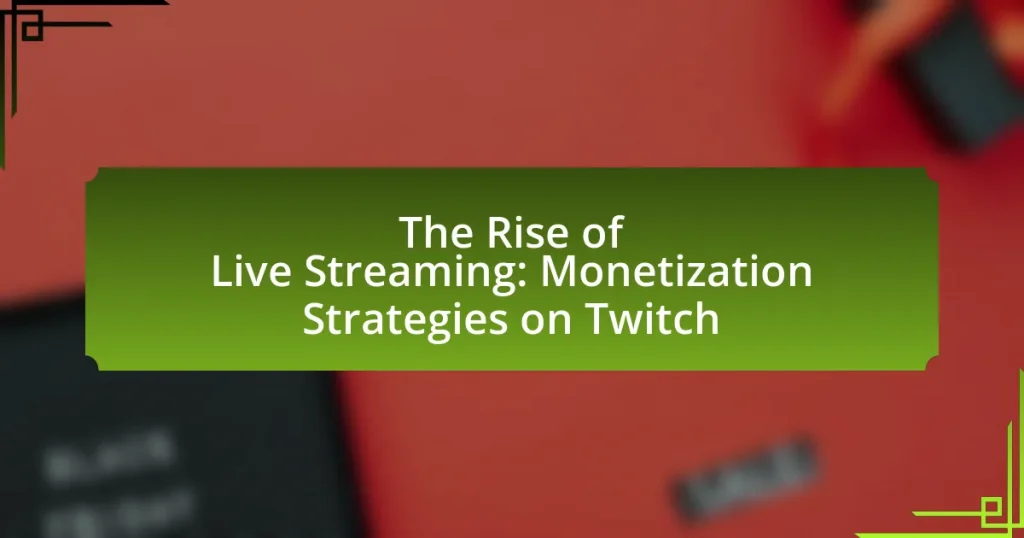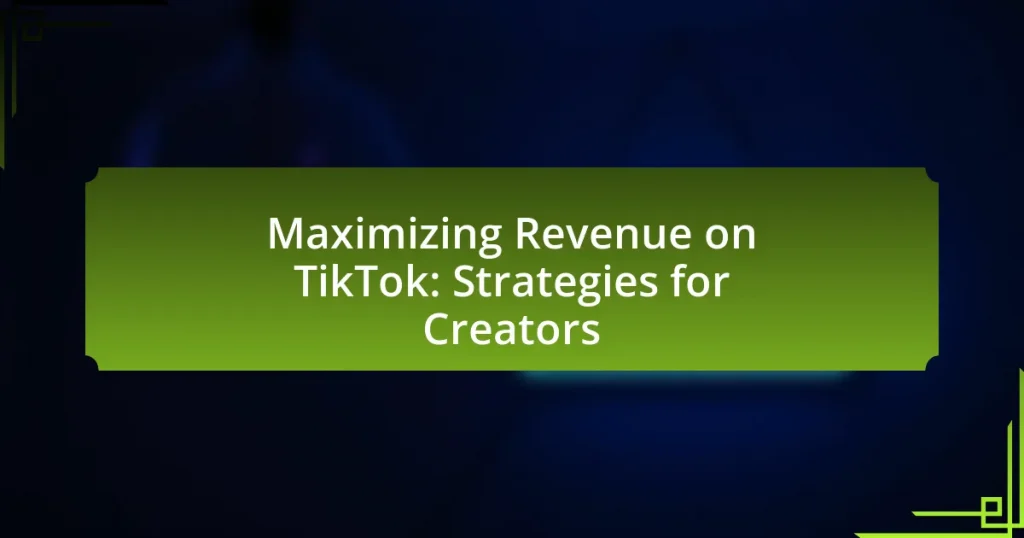Influencer marketing is a strategic approach in social media monetization where brands collaborate with individuals who have substantial followings to promote products or services. This article explores the mechanics of influencer marketing, highlighting its effectiveness in driving sales and enhancing brand visibility through authentic content and audience engagement. Key elements such as influencer credibility, strategic partnerships, and the importance of aligning brand values are discussed, alongside the challenges brands face in measuring ROI and ensuring authenticity. Additionally, the article examines future trends, the impact of technology, and practical tips for brands to optimize their influencer marketing strategies.

What is Influencer Marketing in Social Media Monetization?
Influencer marketing in social media monetization is a strategy where brands collaborate with individuals who have a significant following on social media platforms to promote their products or services. This approach leverages the influencer’s credibility and reach to engage their audience, ultimately driving sales and brand awareness. According to a 2021 survey by Influencer Marketing Hub, 90% of marketers found influencer marketing to be effective, highlighting its growing importance in digital marketing strategies.
How does Influencer Marketing function within social media platforms?
Influencer marketing functions within social media platforms by leveraging the reach and credibility of individuals who have established a following to promote products or services. Brands collaborate with influencers to create authentic content that resonates with the influencer’s audience, thereby increasing brand awareness and driving sales. According to a 2021 survey by HubSpot, 61% of marketers consider influencer marketing to be effective, highlighting its role in enhancing consumer trust and engagement. This effectiveness is further supported by the fact that businesses earn an average of $5.78 for every dollar spent on influencer marketing, demonstrating its financial viability in social media monetization strategies.
What are the key elements that define Influencer Marketing?
Influencer marketing is defined by key elements such as the influencer’s credibility, audience engagement, and strategic partnerships. Credibility is established through the influencer’s expertise and authenticity, which fosters trust among their followers. Audience engagement refers to the level of interaction and connection the influencer has with their audience, often measured by likes, comments, and shares. Strategic partnerships involve collaborations between brands and influencers to create content that aligns with both parties’ goals, enhancing brand visibility and driving consumer action. These elements collectively contribute to the effectiveness of influencer marketing in driving sales and brand awareness in the context of social media monetization.
How do influencers engage with their audience to drive monetization?
Influencers engage with their audience to drive monetization primarily through authentic interactions and strategic content creation. By fostering a sense of community and trust, influencers encourage audience loyalty, which translates into higher engagement rates and increased purchasing behavior. For instance, a study by the Digital Marketing Institute found that 49% of consumers depend on influencer recommendations when making purchasing decisions. Additionally, influencers utilize various platforms to share exclusive promotions, host giveaways, and create interactive content such as polls and Q&A sessions, further enhancing audience participation and driving sales. This engagement not only boosts their visibility but also attracts brands seeking to leverage their influence for marketing campaigns, thereby creating monetization opportunities through sponsorships and affiliate marketing.
Why is Influencer Marketing important for brands?
Influencer marketing is important for brands because it leverages the trust and reach of influencers to effectively engage target audiences. Brands can achieve higher engagement rates and conversion rates through influencer partnerships, as studies show that 49% of consumers depend on influencer recommendations for their purchasing decisions. Additionally, influencer marketing can enhance brand awareness, with 94% of marketers reporting that it is an effective strategy for increasing visibility. This approach allows brands to tap into niche markets and build authentic connections with consumers, ultimately driving sales and fostering brand loyalty.
What advantages does Influencer Marketing provide over traditional advertising?
Influencer marketing offers higher engagement rates compared to traditional advertising. Research indicates that influencer marketing can achieve engagement rates of up to 10% or more, while traditional ads typically see engagement rates below 1%. This increased engagement stems from the trust and authenticity influencers have built with their audiences, leading to more effective communication of brand messages. Additionally, influencer marketing allows for targeted reach, as brands can collaborate with influencers whose followers align with their target demographics, enhancing the likelihood of conversion.
How does Influencer Marketing enhance brand visibility and trust?
Influencer marketing enhances brand visibility and trust by leveraging the established credibility and reach of influencers to connect with their audience. Influencers often have a loyal following that trusts their opinions, which allows brands to gain exposure to potential customers in a more authentic manner. According to a study by the Digital Marketing Institute, 49% of consumers depend on influencer recommendations when making purchasing decisions, highlighting the effectiveness of this marketing strategy in building trust. Additionally, brands that collaborate with influencers can achieve higher engagement rates, as posts featuring influencers receive 11 times more engagement than traditional brand posts, further solidifying brand visibility and consumer trust.
What challenges do brands face in Influencer Marketing?
Brands face several challenges in influencer marketing, primarily including authenticity, measurement of ROI, and regulatory compliance. Authenticity is crucial as consumers increasingly demand genuine endorsements; brands risk backlash if influencers are perceived as inauthentic or overly commercialized. Measurement of ROI presents difficulties since tracking the direct impact of influencer campaigns on sales can be complex, with many brands relying on metrics like engagement rather than concrete sales figures. Regulatory compliance is another significant challenge, as brands must navigate advertising guidelines set by authorities like the Federal Trade Commission, which require clear disclosures of paid partnerships. These challenges highlight the need for brands to carefully select influencers, establish clear metrics for success, and ensure adherence to legal standards to optimize their influencer marketing strategies.
How can brands identify the right influencers for their campaigns?
Brands can identify the right influencers for their campaigns by analyzing audience demographics, engagement rates, and content relevance. By utilizing tools like social media analytics and influencer marketing platforms, brands can assess whether an influencer’s followers align with their target market. For instance, a study by Influencer Marketing Hub found that 63% of marketers consider audience engagement as a key factor in influencer selection, highlighting its importance in ensuring effective campaign outcomes.
What are the potential pitfalls of working with influencers?
The potential pitfalls of working with influencers include misalignment of brand values, lack of authenticity, and unpredictable ROI. Misalignment occurs when an influencer’s audience or values do not match the brand’s target demographic, leading to ineffective campaigns. Lack of authenticity can arise if influencers promote products they do not genuinely use or believe in, which can damage brand credibility. Additionally, the return on investment (ROI) can be unpredictable, as measuring the effectiveness of influencer campaigns can be challenging due to varying engagement rates and audience behaviors. According to a survey by the Digital Marketing Institute, 61% of marketers find it difficult to measure the ROI of influencer marketing, highlighting the uncertainty involved in these partnerships.

How does Influencer Marketing impact social media monetization strategies?
Influencer marketing significantly enhances social media monetization strategies by leveraging the trust and reach of influencers to drive engagement and sales. This approach allows brands to tap into established audiences, resulting in higher conversion rates; for instance, studies show that influencer marketing can yield an ROI of up to $6.50 for every dollar spent. Additionally, platforms like Instagram and TikTok have integrated shopping features that facilitate direct purchases through influencer posts, further monetizing social media interactions. The effectiveness of influencer marketing is evidenced by the fact that 49% of consumers depend on influencer recommendations when making purchase decisions, highlighting its critical role in shaping monetization strategies on social media.
What role do influencers play in driving sales through social media?
Influencers play a crucial role in driving sales through social media by leveraging their established trust and engagement with their audience. Their recommendations can significantly impact consumer purchasing decisions; for instance, a study by the Digital Marketing Institute found that 49% of consumers depend on influencer recommendations for their buying choices. Additionally, influencers often create authentic content that resonates with their followers, leading to higher conversion rates. According to a report by Influencer Marketing Hub, businesses earn an average of $5.78 for every dollar spent on influencer marketing, demonstrating the effectiveness of influencers in generating sales.
How do influencers affect consumer purchasing decisions?
Influencers significantly affect consumer purchasing decisions by leveraging their credibility and reach to shape consumer perceptions and behaviors. Research indicates that 49% of consumers depend on influencer recommendations when making purchasing decisions, highlighting the trust and authority influencers hold over their audience. Additionally, a study by the Digital Marketing Institute found that 70% of teenagers trust influencers more than traditional celebrities, demonstrating the effectiveness of influencer marketing in targeting younger demographics. This influence is further amplified through social proof, where followers perceive products endorsed by influencers as more desirable, leading to increased sales and brand loyalty.
What metrics are used to measure the success of influencer-driven campaigns?
The metrics used to measure the success of influencer-driven campaigns include engagement rate, reach, impressions, conversion rate, and return on investment (ROI). Engagement rate quantifies interactions such as likes, comments, and shares relative to the audience size, indicating how well the content resonates with viewers. Reach measures the total number of unique users who see the content, while impressions count the total views, providing insight into visibility. Conversion rate tracks the percentage of users who take a desired action, such as making a purchase or signing up for a newsletter, directly linked to the campaign. ROI evaluates the financial return generated from the campaign relative to its cost, offering a clear picture of profitability. These metrics collectively provide a comprehensive assessment of an influencer campaign’s effectiveness in achieving marketing objectives.
How can brands effectively collaborate with influencers?
Brands can effectively collaborate with influencers by establishing clear objectives, selecting the right influencers, and fostering authentic relationships. Clear objectives ensure that both parties understand the goals of the collaboration, such as increasing brand awareness or driving sales. Selecting influencers whose audience aligns with the brand’s target demographic enhances the effectiveness of the campaign; for instance, a study by Influencer Marketing Hub found that 63% of marketers believe that choosing the right influencer is crucial for campaign success. Fostering authentic relationships encourages genuine content creation, as influencers are more likely to engage their audience when they believe in the brand’s values. This approach not only improves engagement rates but also builds long-term partnerships that can lead to sustained brand loyalty.
What are the best practices for establishing partnerships with influencers?
The best practices for establishing partnerships with influencers include identifying relevant influencers, ensuring alignment with brand values, and fostering authentic relationships. Identifying relevant influencers involves researching their audience demographics, engagement rates, and content style to ensure they resonate with your target market. Ensuring alignment with brand values means selecting influencers whose beliefs and messaging complement your brand, which enhances credibility and trust among consumers. Fostering authentic relationships requires open communication, collaboration on content creation, and providing influencers with creative freedom, which can lead to more genuine endorsements. According to a study by the Digital Marketing Institute, 49% of consumers depend on influencer recommendations, highlighting the importance of these practices in effective influencer marketing strategies.
How can brands ensure alignment of values with their chosen influencers?
Brands can ensure alignment of values with their chosen influencers by conducting thorough research on the influencer’s background, content, and audience engagement. This involves analyzing the influencer’s previous collaborations, social media posts, and public statements to identify shared values and beliefs. For instance, a study by the Digital Marketing Institute found that 70% of consumers are more likely to trust a brand when they see authentic partnerships with influencers who reflect their values. By prioritizing influencers whose messaging aligns with their brand ethos, companies can foster genuine connections with their target audience and enhance brand credibility.

What are the future trends in Influencer Marketing for social media monetization?
Future trends in influencer marketing for social media monetization include the rise of micro and nano influencers, increased focus on authenticity, and the integration of advanced analytics for performance measurement. Micro and nano influencers, who often have smaller but highly engaged audiences, are becoming more appealing to brands due to their perceived authenticity and cost-effectiveness. A study by Influencer Marketing Hub in 2022 indicated that campaigns with micro influencers can yield up to 60% higher engagement rates compared to those with larger influencers. Additionally, brands are prioritizing authentic content that resonates with audiences, as consumers increasingly seek genuine connections over polished advertisements. The use of advanced analytics tools is also on the rise, allowing brands to track campaign performance in real-time and optimize their strategies based on data-driven insights. This trend is supported by a report from eMarketer, which projected that spending on influencer marketing would reach $15 billion by 2022, highlighting the growing importance of measurable outcomes in influencer partnerships.
How is technology shaping the future of Influencer Marketing?
Technology is shaping the future of influencer marketing by enabling more precise targeting, enhancing engagement through advanced analytics, and facilitating authentic connections between brands and influencers. The rise of artificial intelligence and machine learning allows brands to analyze vast amounts of data to identify the most effective influencers for their campaigns, improving return on investment. Additionally, platforms like Instagram and TikTok are integrating shopping features, allowing influencers to directly link products in their content, which streamlines the purchasing process for consumers. According to a report by Influencer Marketing Hub, the influencer marketing industry is projected to reach $16.4 billion in 2022, highlighting the growing importance of technology in driving this trend.
What emerging platforms are influencing the landscape of influencer collaborations?
Emerging platforms such as TikTok, Clubhouse, and Twitch are significantly influencing the landscape of influencer collaborations. TikTok’s short-form video format encourages creative content and rapid virality, making it a prime space for influencers to engage with audiences and brands. Clubhouse, with its audio-based discussions, allows influencers to connect with followers in real-time, fostering deeper engagement and collaboration opportunities. Twitch, primarily known for gaming, has expanded to include various content creators, enabling influencers to monetize their streams through sponsorships and viewer donations. These platforms are reshaping how brands and influencers interact, driving innovative marketing strategies and collaborations.
How will consumer behavior evolve in response to influencer marketing trends?
Consumer behavior will increasingly shift towards valuing authenticity and relatability in influencer marketing. As consumers become more discerning about the content they engage with, they will favor influencers who demonstrate genuine connections with their audience and transparency in their endorsements. Research indicates that 61% of consumers trust influencer recommendations, highlighting the importance of perceived authenticity in driving purchasing decisions. Consequently, brands will need to collaborate with influencers who align closely with their values and resonate with their target demographics to effectively influence consumer choices.
What practical tips can brands implement for successful Influencer Marketing?
Brands can implement several practical tips for successful influencer marketing, including selecting the right influencers, establishing clear goals, and fostering authentic relationships. Choosing influencers whose audience aligns with the brand’s target demographic ensures that the message reaches the intended consumers effectively. Setting specific, measurable goals, such as increasing brand awareness or driving sales, allows brands to evaluate the success of their campaigns. Additionally, building genuine relationships with influencers encourages authentic content creation, which resonates more with audiences. According to a study by the Digital Marketing Institute, 49% of consumers depend on influencer recommendations, highlighting the importance of authenticity in influencer partnerships.
How can brands create effective influencer marketing campaigns?
Brands can create effective influencer marketing campaigns by selecting the right influencers who align with their target audience and brand values. Research indicates that 49% of consumers depend on influencer recommendations for their purchasing decisions, highlighting the importance of authenticity and relevance in influencer partnerships. Additionally, brands should establish clear campaign goals, such as increasing brand awareness or driving sales, and provide influencers with creative freedom to engage their audience effectively. Data from the Influencer Marketing Hub shows that businesses earn an average of $5.78 for every dollar spent on influencer marketing, reinforcing the strategy’s potential for high returns when executed properly.
What common mistakes should brands avoid in influencer partnerships?
Brands should avoid the mistake of selecting influencers solely based on follower count rather than engagement metrics. Research indicates that influencers with smaller, highly engaged audiences often yield better results in terms of conversion rates and brand loyalty. Additionally, brands should not overlook the importance of aligning their values with those of the influencer, as mismatched partnerships can lead to authenticity issues and negative consumer perceptions. Furthermore, failing to establish clear expectations and deliverables can result in miscommunication and unsatisfactory campaign outcomes. Lastly, neglecting to measure and analyze the performance of influencer partnerships can prevent brands from understanding the return on investment and optimizing future collaborations.



